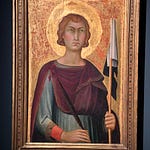Hello everyone,
[TL:DR - watch the video then scroll down to the extract]
A quick update
I hope this summer is treating you as you deserve to be treated. (And I hope that means: well.) Apologies for radio silence but I had to take a break from, like, everything. So I went away.
First I went to Sun Valley, Idaho to attend/perform at the Sun Valley Writers’ Conference. You can check out one of my lectures from that incredible event here. Or it’s on YouTube here.
After that, I went to Crete, where I like to go every summer. Success there counts as not being eaten by the Minotaur and reading some interesting books, and by those metrics, it all went well.
This week I was at the Edinburgh Book Festival (great) and today, at long last I am back at my desk.
Now the bit about Richard III
Something else that is at my desk is a stack of copies of a book called The Life and Death of Richard III, by Anthony Cheetham.
This is a terrific biography of the last and most notorious Plantagenet king, whose short reign in 1483-85 produced arguably the most peculiar afterlife of any British monarch.
Anthony is one of the brilliant publishers in modern British history, and he is also a great man whom I have been lucky to know for most of my working adult life. He asked me to write a new introduction and epilogue to his book, which is returning to the shelf after its original publication in 1972.
I was happy to oblige.
For subscribers to this Substack, I include a portion of my introduction below. I hope it gives you a flavour of the book as a whole.
I also wonder what you think about my take on Richard III?
In my introduction to the book I call him ‘a draughts [i.e. checkers] player trying his hand for the first time at chess .’
The ‘disappearing’ of the Princes in the Tower was sensible - if you view the decision as it ought to be viewed by the standards of the fifteenth century, which is not as a moral decision but as a political one.
Only a total fool (or at least, someone who had not lived through the catastrophic readeption of Henry VI) would have left the boys alive, even behind the walls of the Tower of London.
And Richard was not a total fool.
But for the most part he was a second-rate political operator, loyal to a cause and capable of taking tough decisions but rather lacking in rat-brain cunning. Anthony writes that he possessed ‘too little guile rather than too much.’
I agree.
Anyway, rabbit rabbit - I’ve gone away and now I can’t shut up. I shall leave you with a portion of my introduction to The Life and Death of Richard III, and I hope that if you enjoy it, you’ll seek out the book itself.
See you soon
dan x
The Life And Death of Richard III by Anthony Cheetham
Introduction by Dan Jones
In the bleak dark of the early morning on Monday 22nd August 1485, King Richard III of England rose from a fitful sleep. Lying in camp with his army he had been tormented by visions of ‘evil spirits haunting evidently about him [which] would not let him rest.’ Richard had awoken with an empty belly and a guilty conscience. But the hour was so small that there was no breakfast to be found, and no priest awake to absolve him. Thus began, inauspiciously, the last day of his life.
A few hours later Richard III - usurper and regicide - led his men into battle in a desperate attempt to cling to his crown. In this he was no different from most other English kings of his century: the fifteenth century, a time when Fortune’s Wheel span as fast as a fairground ride. Henry IV, Henry VI and Edward IV had all enjoyed uncertain claims to royal office and all had found themselves at war, with life and throne at stake. Henry Tudor - the man who now challenged Richard at Bosworth Field - would have to walk through the fire in his turn.
Becoming a king in this age was more often a matter of self-help than simple inheritance. Remaining king could be a white-knuckle ride. ‘Within the hollow crown,’ wrote Shakespeare, much later, ‘which rounds the mortal temples of a king, keeps death his court.’ Death found Richard at Bosworth that day. He was hacked down in the thick of battle, stripped naked, mutilated and thrown in a shallow grave. His fate was not merely to be the last of the Plantagenet kings who had ruled England for more than three hundred years. He was also doomed to be remembered as a villain.
Listen to this episode with a 7-day free trial
Subscribe to History, Etc to listen to this post and get 7 days of free access to the full post archives.









